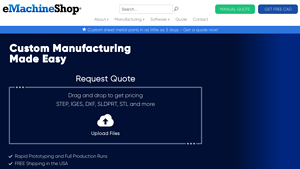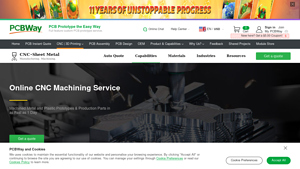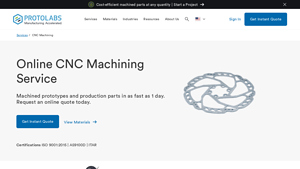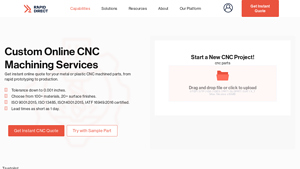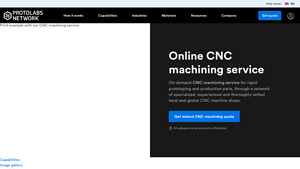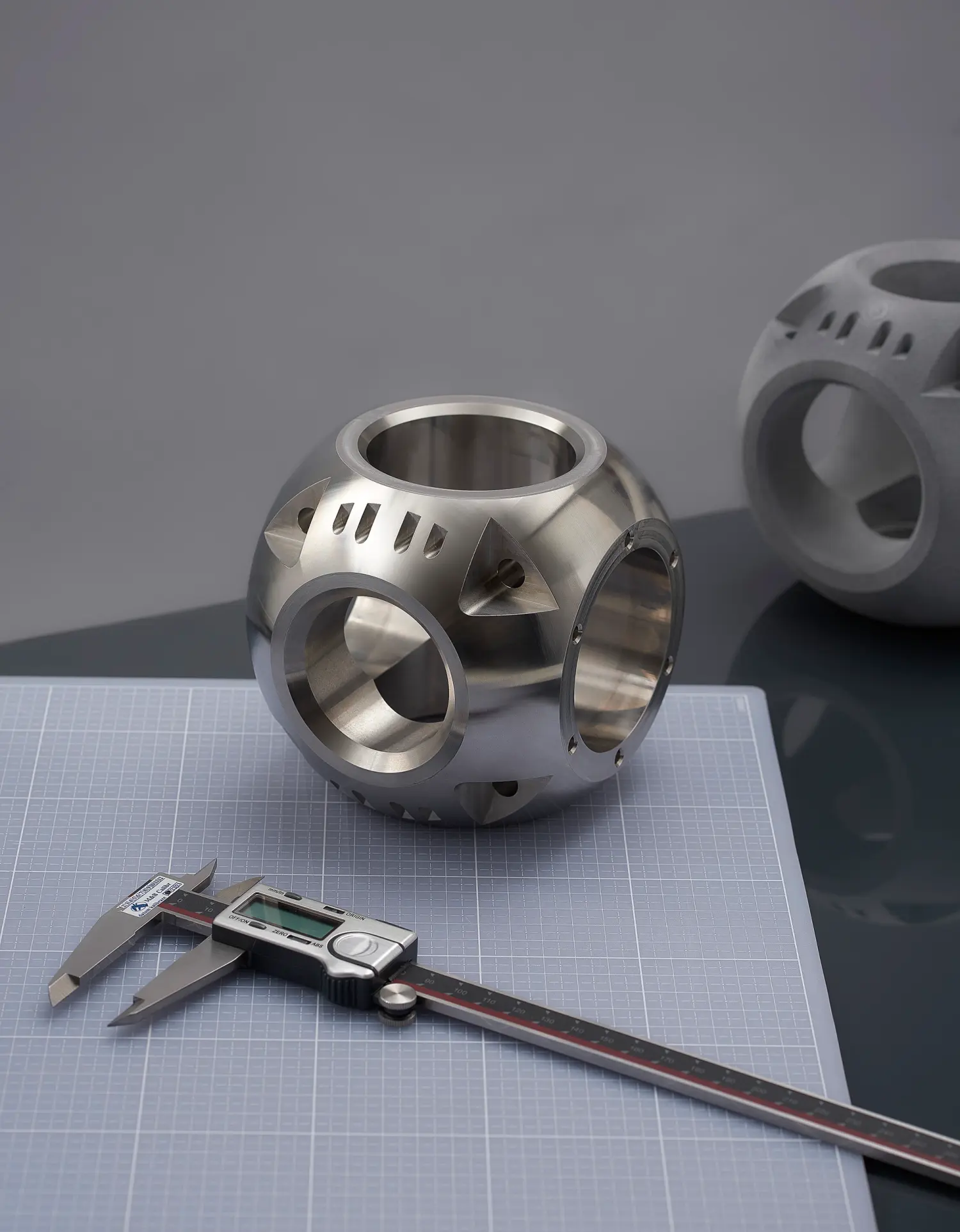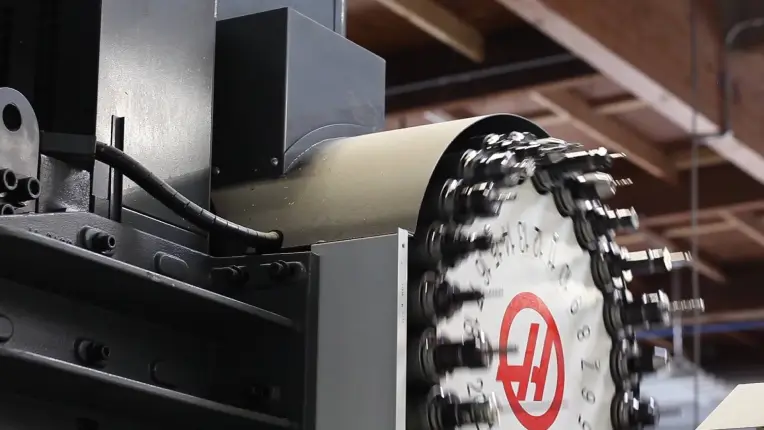Top 7 Online Cnc Machining Service Manufacturers & Suppliers List
1. eMachineShop – Custom Manufacturing Services
Domain: emachineshop.com
Registered: 1999 (26 years)
Introduction: eMachineShop offers custom manufacturing services including CNC Machining, Injection Molding, 3D Printing, and Sheet Metal Fabrication. Key features include:
– Fast quotes and free CAD software.
– Custom sheet metal parts available in as little as 3 days.
– Upload support for various CAD file formats (e.g., STEP, IGES, DXF, STL).
– Rapid prototyping and full production runs.
– Free shipping in the…
2. PCBWay – CNC Machining & 3D Printing Services
Domain: pcbway.com
Registered: 2012 (13 years)
Introduction: CNC Machining Service includes precision CNC machining and rapid prototyping parts. It offers CNC milling (3-, 4-, & full 5-axis), CNC turning, and various 3D printing services (SLA, DLP, FDM, SLM, SLS, PolyJet). The service provides a wide range of materials including metals (Aluminum, Stainless steel, Brass, Copper, Titanium, Mild steel, Alloy steel, Tool steel, Spring steel) and plastics (ABS, …
3. Protolabs – CNC Machining Services
Domain: protolabs.com
Registered: 2006 (19 years)
Introduction: Online CNC Machining Service offering cost-efficient machined parts at any quantity. Capabilities include CNC Milling (3-axis and 5-axis indexed milling) and CNC Turning (with live tooling for cylindrical features). Machined prototypes and production parts available in as fast as 1 day. Materials include various metals (Aluminum, Brass, Copper, Stainless Steel, Steel Alloy, Mild Low Carbon, Titani…
4. PartsBadger – CNC Machining Services
Domain: parts-badger.com
Registered: 2016 (9 years)
Introduction: PartsBadger offers a variety of online CNC machining services including multi-axis machining, Swiss CNC machining, surface finishes, injection molding, 3D printing, sheet metal services, urethane casting, and investment casting. Key features include:
– Instant Quote system for immediate pricing
– Rapid Quote for custom quotes in 2-6 hours
– 2D Quote for design assistance with various file forma…
5. 3DEXPERIENCE Make – CNC Machining Service
Domain: 3ds.com
Registered: 1995 (30 years)
Introduction: CNC Machining Service by 3DEXPERIENCE Make is an on-demand manufacturing platform connecting designers and engineers with industrial CNC machining service providers primarily in North America and Europe. The service is suitable for small and large runs, including mockups and prototypes. Key features include an instant quote engine providing quotes in seconds, secure payments, and protected IP with…
6. RapidDirect – Custom CNC Machining Services
Domain: rapiddirect.com
Registered: 2010 (15 years)
Introduction: Online CNC Machining Services for Custom Parts, Instant CNC Quote, CNC Machining, CNC Milling, CNC Turning, Injection Molding, Plastic Injection Molding, Injection Mold Tooling, Sheet Metal Fabrication, 3D Printing, Vacuum Casting, Die Casting, Finishing Services, Rapid Prototyping, On-Demand Manufacturing Solutions, Industries served: Aerospace, Automotive, Consumer Products, Medical Devices, Rob…
7. Hubs – On-Demand CNC Machining Service
Domain: hubs.com
Registered: 1998 (27 years)
Introduction: Online CNC Machining Service: On-demand CNC machining service for rapid prototyping and production parts through a network of specialized, experienced, and vetted local and global CNC machine shops. Capabilities include CNC milling (3 & 5 axis), CNC turning, and additional services like sheet metal fabrication and injection molding. Materials available include various metals (e.g., aluminum, stain…
Introduction: Navigating the Global Market for online cnc machining service
In an increasingly interconnected world, sourcing reliable online CNC machining services can be a daunting challenge for international B2B buyers. Whether you’re in Africa, South America, the Middle East, or Europe, navigating the complexities of global supply chains, varying quality standards, and fluctuating costs requires a strategic approach. This guide aims to demystify the landscape of online CNC machining services, providing you with essential insights into the types of machining processes available, their diverse applications across industries, and effective supplier vetting methods.
Understanding the nuances of CNC machining—from milling and turning to advanced 5-axis machining—can significantly impact your production timelines and product quality. This comprehensive resource will also delve into cost considerations, including material choices and shipping logistics, ensuring that you are equipped to make informed purchasing decisions. Additionally, we will highlight key certifications and quality assurance practices that reputable suppliers should possess, safeguarding your investments in precision manufacturing.
By leveraging the insights presented in this guide, B2B buyers can confidently navigate the global market for online CNC machining services, ultimately enhancing their operational efficiency and product offerings. Empower your business with the knowledge needed to select the right partners and streamline your production processes, irrespective of your geographical location.
Understanding online cnc machining service Types and Variations
| Type Name | Key Distinguishing Features | Primary B2B Applications | Brief Pros & Cons for Buyers |
|---|---|---|---|
| CNC Milling | Utilizes rotating cutting tools for shaping materials; available in 3, 4, and 5-axis configurations. | Aerospace, automotive, industrial machinery | Pros: High precision, versatile for complex shapes. Cons: May have longer lead times for intricate designs. |
| CNC Turning | Involves rotating the workpiece against a stationary cutting tool; ideal for cylindrical parts. | Medical devices, consumer products, automotive | Pros: Excellent for high-volume production, consistent quality. Cons: Limited to rotational geometries. |
| CNC Routing | Uses a router to cut materials into specific shapes; suitable for larger sheets. | Signage, furniture, custom parts | Pros: Fast processing of large sheets, versatile material options. Cons: Less precision than milling for detailed work. |
| CNC Laser Cutting | Employs laser technology to cut through materials with high precision; often used for thin materials. | Electronics, sheet metal fabrication | Pros: Clean cuts, minimal material waste. Cons: Not suitable for thicker materials. |
| CNC 3D Printing | Combines CNC machining with additive manufacturing techniques for complex geometries. | Prototyping, aerospace, medical applications | Pros: Rapid prototyping capabilities, flexible design options. Cons: Limited material options compared to traditional machining. |
What Are the Characteristics of CNC Milling Services?
CNC milling is a highly versatile machining service that employs rotating cutting tools to remove material from a workpiece. Available in 3, 4, and 5-axis configurations, it allows for intricate designs and complex geometries. This service is particularly well-suited for industries such as aerospace and automotive, where precision is critical. When considering CNC milling, B2B buyers should evaluate lead times and the complexity of their designs, as intricate parts may require longer production times.
How Does CNC Turning Differ from Other Machining Types?
CNC turning utilizes a rotating workpiece to achieve cylindrical shapes, making it ideal for parts like shafts and bushings. This service excels in high-volume production, ensuring consistent quality across numerous units. Common applications include medical devices and automotive components. Buyers should consider the geometrical constraints of their designs, as CNC turning is limited to rotational forms. Additionally, the efficiency of the process can significantly reduce costs for large orders.
What Are the Advantages of CNC Routing Services?
CNC routing is designed for cutting large sheets of materials into specific shapes. It is particularly effective for applications in signage and furniture, where larger dimensions are required. The speed of CNC routing allows for quick turnaround times, making it an attractive option for businesses needing rapid production. However, buyers should note that while CNC routing is fast, it may not achieve the same level of precision as CNC milling, especially for intricate designs.
Why Choose CNC Laser Cutting for Your Projects?
CNC laser cutting employs high-powered lasers to create precise cuts in materials, particularly thin sheets. This method is widely used in electronics and sheet metal fabrication due to its ability to produce clean cuts with minimal waste. While it offers exceptional precision, it is not suitable for thicker materials. Businesses should assess their material requirements and the desired finish, as laser cutting may provide an edge in applications where aesthetics are important.
What Makes CNC 3D Printing a Unique Option?
CNC 3D printing merges traditional machining with additive manufacturing, allowing for the creation of complex geometries and prototypes. This service is beneficial for industries like aerospace and medical, where rapid prototyping is essential. However, the range of materials available for 3D printing is often more limited compared to conventional machining methods. Buyers should weigh the benefits of quick iterations against material constraints to determine if CNC 3D printing meets their project needs.
Key Industrial Applications of online cnc machining service
| Industry/Sector | Specific Application of online cnc machining service | Value/Benefit for the Business | Key Sourcing Considerations for this Application |
|---|---|---|---|
| Aerospace | Manufacturing of precision components for aircraft | High precision and reliability in critical parts | Certifications (e.g., AS9100), material traceability |
| Medical Devices | Production of surgical instruments and implants | Compliance with stringent safety and quality standards | ISO certifications, biocompatibility of materials |
| Automotive | Creation of custom engine parts and prototypes | Enhanced performance and faster time-to-market | Volume flexibility, advanced materials availability |
| Robotics | Development of robotic arms and automation tools | Customization for specific applications and tasks | Design support, rapid prototyping capabilities |
| Consumer Electronics | Fabrication of enclosures and internal components | Quick adaptation to market trends and consumer demands | Cost efficiency, diverse material options |
How is Online CNC Machining Service Applied in Aerospace?
In the aerospace industry, online CNC machining services are crucial for producing high-precision components such as turbine blades, brackets, and housings. Given the rigorous safety standards and performance requirements, these parts must meet strict tolerances and be made from lightweight yet durable materials. For international buyers, especially from regions with emerging aerospace sectors, sourcing from certified suppliers ensures compliance with industry regulations, such as AS9100, while also facilitating efficient logistics and material traceability.
What Role Does CNC Machining Play in Medical Devices?
The medical device sector relies heavily on online CNC machining for the fabrication of surgical instruments, implants, and diagnostic equipment. These components must adhere to stringent health and safety regulations, requiring suppliers to possess ISO certifications and demonstrate the use of biocompatible materials. For B2B buyers in Africa and South America, selecting a machining service with a robust quality assurance process is essential to mitigate risks associated with product safety and efficacy.
How is CNC Machining Used in the Automotive Industry?
In automotive manufacturing, online CNC machining services are employed to produce everything from intricate engine parts to custom prototypes for new vehicle models. The ability to quickly transition from design to production enables automotive companies to enhance performance and reduce time-to-market. Buyers should consider the supplier’s capabilities for volume flexibility and material options, ensuring that they can adapt to changing market demands while maintaining high quality.
What Applications Exist for CNC Machining in Robotics?
Robotics applications benefit from online CNC machining through the creation of custom robotic arms, joints, and automation tools tailored to specific tasks. This customization allows businesses to innovate and remain competitive in a rapidly evolving market. For international buyers, sourcing from suppliers that offer design support and rapid prototyping can significantly streamline the development process and facilitate faster deployment of robotic solutions.
How Do Consumer Electronics Leverage Online CNC Machining?
The consumer electronics industry utilizes online CNC machining to fabricate enclosures, internal components, and prototypes for new devices. This rapid production capability allows companies to respond quickly to market trends and consumer preferences. When sourcing CNC services, businesses should prioritize cost efficiency and the availability of diverse materials to ensure they can produce high-quality components that meet consumer demands without compromising on lead times.
3 Common User Pain Points for ‘online cnc machining service’ & Their Solutions
Scenario 1: Delays in Production Due to Unclear Specifications
The Problem:
B2B buyers often encounter significant delays when their CNC machining service providers misinterpret specifications. This issue can stem from vague design files, incomplete technical drawings, or insufficient communication regarding materials and tolerances. For instance, an engineering team might provide a CAD file that lacks critical dimensions or surface finish requirements. When the manufacturer proceeds based on these unclear specifications, it can lead to reworks, production hold-ups, and ultimately, missed deadlines. This not only affects project timelines but can also strain relationships with stakeholders who are relying on timely delivery.
The Solution:
To mitigate this problem, buyers should prioritize clarity and detail in their specifications. Begin by thoroughly reviewing your design files and ensuring that all necessary dimensions, tolerances, materials, and surface finishes are explicitly stated. Utilize standardized templates for technical drawings that outline essential details. Additionally, engage in proactive communication with your CNC service provider. Before placing an order, consider scheduling a consultation to discuss the project in detail, ensuring both parties have a mutual understanding of expectations. Many online CNC machining platforms also offer design feedback tools—take advantage of these features to identify potential issues early in the process. By establishing clear communication channels and detailed specifications, you can streamline production and avoid costly delays.
Scenario 2: Quality Assurance Challenges with Outsourced Machining
The Problem:
Quality assurance can be a significant concern when outsourcing CNC machining services, especially for international buyers. Variability in manufacturing standards, material quality, and machining precision can lead to parts that do not meet the required specifications. For example, a company in Europe might face challenges with a supplier in Asia where the quality control measures differ significantly. This discrepancy can result in defective parts that require re-ordering, driving up costs and extending lead times.
The Solution:
To address quality assurance challenges, buyers should conduct thorough due diligence on potential CNC machining service providers. Look for companies with recognized certifications such as ISO 9001 or AS9100D, which indicate adherence to stringent quality management systems. Additionally, request samples of previous work and references from past clients to gauge the reliability of the supplier’s quality control processes. Implementing a robust inspection protocol is also crucial; specify that all parts undergo quality checks at various stages of production. Some online CNC machining services offer options for enhanced inspections and certifications, which can provide peace of mind. By selecting a reputable supplier and maintaining a rigorous quality assurance process, you can ensure that the parts meet your specifications consistently.
Scenario 3: High Costs Due to Lack of Understanding of Pricing Structures
The Problem:
Many B2B buyers struggle with understanding the pricing structures of online CNC machining services, which can lead to unexpected costs. Pricing can vary widely based on factors such as material selection, complexity of the design, and production volume. A buyer might enter a project expecting a certain budget, only to find that additional costs arise from factors they did not fully comprehend, such as setup fees or expedited shipping charges. This situation can cause financial strain and impact overall project viability.
The Solution:
To navigate the complexities of pricing, buyers should invest time in understanding the cost factors associated with CNC machining. Begin by familiarizing yourself with the materials and processes available, as different materials can significantly impact pricing. Utilize online quoting tools provided by CNC service platforms to experiment with different parameters and get a sense of how changes affect costs. Additionally, engage in discussions with sales representatives to clarify all potential fees and options for bulk ordering or long-term partnerships that might reduce costs. Some services offer transparent pricing breakdowns, which can help you understand where your budget is allocated. By proactively managing your budget and utilizing available resources, you can avoid unexpected costs and make informed decisions that align with your financial goals.
Strategic Material Selection Guide for online cnc machining service
When selecting materials for online CNC machining services, it is essential to consider the specific properties and applications of each material. This analysis focuses on four common materials: aluminum, stainless steel, ABS plastic, and PEEK. Understanding their characteristics, advantages, and limitations will help international B2B buyers make informed decisions.
What are the Key Properties of Aluminum for CNC Machining?
Aluminum is renowned for its lightweight and excellent machinability. It has a high strength-to-weight ratio and is resistant to corrosion, making it suitable for various applications, including automotive and aerospace. Aluminum can withstand moderate temperatures, typically up to 150°C, without significant deformation.
Pros and Cons: The primary advantage of aluminum is its low density, which reduces shipping costs and enhances performance in applications requiring lightweight materials. However, it can be more expensive than some other metals and may not be suitable for high-temperature applications beyond its rating.
Impact on Application: Aluminum is compatible with various media, including water and chemicals, but it may not be suitable for applications involving strong acids or bases.
Considerations for International Buyers: Buyers should ensure compliance with international standards such as ASTM B221 for aluminum extrusions. In regions like Africa and South America, sourcing aluminum may be cost-effective due to local availability.
How Does Stainless Steel Perform in CNC Machining?
Stainless steel is known for its exceptional strength and corrosion resistance, making it ideal for applications in harsh environments, such as medical devices and food processing equipment. It can withstand high temperatures, often exceeding 300°C, depending on the grade.
Pros and Cons: The durability and strength of stainless steel are significant advantages, providing long-lasting products. However, its machining can be complex due to its toughness, leading to higher manufacturing costs and longer lead times.
Impact on Application: Stainless steel is compatible with a wide range of media, including water, steam, and various chemicals, making it suitable for diverse industrial applications.
Considerations for International Buyers: Compliance with standards like ASTM A240 is crucial. Buyers in the Middle East may prefer specific grades of stainless steel that meet local corrosion resistance requirements.
What are the Benefits of Using ABS Plastic in CNC Machining?
Acrylonitrile Butadiene Styrene (ABS) is a versatile thermoplastic known for its impact resistance and ease of machining. It is commonly used in consumer products, automotive components, and electronic housings.
Pros and Cons: ABS is lightweight and cost-effective, making it a popular choice for prototyping and low-volume production. However, it has lower temperature resistance (up to 80°C) and can be less durable than metals.
Impact on Application: ABS is suitable for applications that require good impact resistance but may not perform well in high-temperature environments or with certain chemicals.
Considerations for International Buyers: Buyers should verify compliance with standards such as ISO 527 for plastic materials. In regions like Europe, there may be specific regulations regarding the use of plastics in consumer goods.
Why Choose PEEK for CNC Machining Applications?
Polyether ether ketone (PEEK) is a high-performance thermoplastic known for its exceptional chemical resistance and high-temperature stability (up to 250°C). It is often used in aerospace, medical, and automotive applications.
Pros and Cons: The primary advantage of PEEK is its ability to maintain mechanical properties at elevated temperatures and in aggressive chemical environments. However, it is one of the more expensive materials and can be challenging to machine.
Impact on Application: PEEK is compatible with a wide range of media, including harsh chemicals, making it suitable for demanding applications.
Considerations for International Buyers: Buyers should ensure PEEK complies with relevant standards, such as ASTM D638. In regions like South America, sourcing PEEK may involve higher costs due to importation.
Summary Table of Material Selection for CNC Machining
| Material | Typical Use Case for online cnc machining service | Key Advantage | Key Disadvantage/Limitation | Relative Cost (Low/Med/High) |
|---|---|---|---|---|
| Aluminum | Aerospace components, automotive parts | Lightweight and corrosion-resistant | Higher cost than some metals | Medium |
| Stainless Steel | Medical devices, food processing equipment | Exceptional strength and durability | Complex machining | High |
| ABS Plastic | Consumer products, electronic housings | Cost-effective and easy to machine | Lower temperature resistance | Low |
| PEEK | Aerospace, medical applications | High-temperature stability | Expensive and challenging to machine | High |
This strategic material selection guide provides essential insights for international B2B buyers, enabling them to choose the right materials for their CNC machining needs based on performance, cost, and application suitability.
In-depth Look: Manufacturing Processes and Quality Assurance for online cnc machining service
What Are the Key Manufacturing Processes in Online CNC Machining Services?
Online CNC machining services encompass a series of well-defined manufacturing processes aimed at producing high-precision parts from various materials, including metals and plastics. Understanding these processes is crucial for B2B buyers, particularly those in international markets such as Africa, South America, the Middle East, and Europe.
How Is Material Prepared in CNC Machining?
The initial stage of CNC machining begins with material preparation, where raw materials are selected based on the desired properties of the final product. Common materials include aluminum, stainless steel, brass, and various plastics. Buyers should ensure that the supplier can source high-quality materials that meet industry specifications.
Once the materials are selected, they undergo cutting and sizing to fit the machine’s specifications. This step may involve sawing, shearing, or laser cutting to achieve the required dimensions. It’s essential for buyers to verify that the supplier adheres to international standards for material quality, as this will directly impact the performance and durability of the machined parts.
What Forming Techniques Are Commonly Used in CNC Machining?
Forming is the next critical stage where the actual machining occurs. CNC machining utilizes several techniques, including milling, turning, and routing.
-
Milling involves the use of rotary cutters to remove material from a workpiece. It can be performed on 3-axis, 4-axis, or 5-axis machines, enabling the production of complex geometries.
-
Turning is a process where the workpiece is rotated against a stationary cutting tool, typically used for cylindrical parts.
-
Routing is often used for cutting softer materials and can achieve intricate designs and shapes.
For B2B buyers, it’s important to understand the capabilities of the supplier’s machinery. Suppliers should provide insights into their milling and turning capabilities, including the maximum part dimensions and tolerances that can be achieved.
What Assembly Processes Are Involved in CNC Machining?
While many CNC machining services focus solely on producing individual parts, some may offer assembly services. This stage involves joining multiple machined components into a final product. Common assembly techniques include welding, fastening, and adhesive bonding.
Buyers should inquire about the supplier’s assembly capabilities, especially if the end product requires precision alignment or specific tolerances. Understanding how the supplier manages the assembly process can help ensure that the final product meets the necessary specifications.
How Is Finishing Achieved in CNC Machining?
Finishing is a vital stage that improves the surface quality and aesthetic appeal of the machined parts. Various finishing options are available, including anodizing, plating, and painting. Each method provides different benefits, such as corrosion resistance or enhanced appearance.
B2B buyers should discuss finishing requirements early in the procurement process, as this can affect lead times and costs. Understanding the finishing capabilities of a supplier can also help in selecting the right partner for specific industry needs, such as medical or aerospace applications that have stringent finishing standards.
What Quality Assurance Practices Are Essential in Online CNC Machining?
Quality assurance (QA) is critical in CNC machining, ensuring that parts meet defined specifications and standards throughout the manufacturing process. A robust QA system can help B2B buyers mitigate risks associated with defective components.
Which International Standards Should B2B Buyers Look For?
International standards play a pivotal role in establishing a quality framework for manufacturing processes. For CNC machining, suppliers should adhere to ISO certifications such as:
- ISO 9001:2015: This standard focuses on quality management systems and ensures consistent quality in products and services.
- ISO 13485: Particularly relevant for medical device manufacturing, this standard ensures quality in production and design.
- IATF 16949: This certification is essential for suppliers in the automotive industry.
- AS9100D: A standard for aerospace quality management systems.
B2B buyers should prioritize suppliers with these certifications, as they demonstrate a commitment to quality and continuous improvement.
What Are the Key Quality Control Checkpoints in CNC Machining?
A comprehensive quality control (QC) system includes several checkpoints throughout the manufacturing process:
- Incoming Quality Control (IQC): This initial checkpoint assesses the quality of raw materials before they enter production.
- In-Process Quality Control (IPQC): This involves monitoring the machining process itself, ensuring that tolerances and specifications are met during production.
- Final Quality Control (FQC): This final inspection verifies that the finished parts meet all specifications before shipment.
By understanding these QC checkpoints, buyers can better assess the reliability of their suppliers.
How Can B2B Buyers Verify Supplier Quality Control?
To ensure that a supplier maintains stringent quality control standards, B2B buyers can employ several verification methods:
-
Audits: Conducting on-site audits allows buyers to assess the supplier’s manufacturing processes and quality management systems firsthand.
-
Quality Reports: Requesting regular quality reports can provide insights into defect rates, inspection results, and corrective actions taken.
-
Third-Party Inspections: Engaging third-party inspectors can offer an unbiased assessment of the supplier’s quality practices.
For international buyers, particularly those from diverse regions like Africa, South America, and the Middle East, understanding the nuances of QC certifications and practices can aid in selecting reliable suppliers.
What Are the QC and Certification Nuances for International B2B Buyers?
When dealing with international suppliers, B2B buyers must consider the complexities of quality assurance and certification. Different countries may have varying standards and regulations, which can affect the acceptance of certain certifications.
-
CE Marking: For products sold in Europe, CE marking signifies compliance with health, safety, and environmental protection standards. Buyers should ensure that their suppliers can provide products that meet these requirements.
-
API Standards: In industries like oil and gas, the American Petroleum Institute (API) sets standards for quality and safety. Buyers should confirm that suppliers are compliant if they operate in these sectors.
Understanding these certification nuances will help buyers navigate international markets and ensure that they receive high-quality products that comply with local regulations.
Conclusion
In summary, the manufacturing processes and quality assurance practices in online CNC machining services are critical for B2B buyers seeking reliable suppliers. By understanding the stages of manufacturing, the importance of quality control, and the nuances of international certifications, buyers can make informed decisions that will ultimately contribute to their operational success.
Practical Sourcing Guide: A Step-by-Step Checklist for ‘online cnc machining service’
Introduction
Navigating the procurement process for online CNC machining services can be complex, especially for international B2B buyers. This checklist provides a clear, step-by-step guide to help you efficiently source high-quality machining services that meet your specific needs, ensuring a seamless collaboration with suppliers.
1. Define Your Technical Specifications
Begin by clearly outlining the technical requirements for your project. This includes dimensions, tolerances, materials, and surface finishes. Having detailed specifications ensures that suppliers understand your needs, reducing the risk of errors and miscommunication later in the process.
- Key considerations:
- Specify the type of CNC machining (milling, turning, etc.).
- Identify any special material requirements or certifications.
2. Research Potential Suppliers
Conduct thorough research to identify potential CNC machining service providers. Look for suppliers that specialize in your industry or have experience with similar projects. This step is crucial to ensure that you partner with a company that can meet your specific needs.
- What to look for:
- Supplier reviews and ratings on platforms like Trustpilot or industry forums.
- Case studies showcasing previous work relevant to your project.
3. ✅ Verify Supplier Certifications
Before moving forward, confirm that the suppliers have relevant certifications. ISO certifications, such as ISO 9001 or AS9100, indicate adherence to quality management standards, which is essential for ensuring the reliability of your parts.
- Why it matters:
- Certifications are a mark of quality and compliance.
- They can also influence the speed and accuracy of your project.
4. Request Quotes and Compare Pricing
Reach out to shortlisted suppliers for quotes based on your defined specifications. When comparing prices, ensure that you are considering similar services and quality levels to avoid unexpected costs later.
- Things to consider:
- Inquire about additional costs, such as shipping or tariffs, especially for international orders.
- Compare not just the price but also the value-added services like rapid prototyping or design feedback.
5. Ask for Samples or Prototypes
If possible, request samples or prototypes from potential suppliers. This allows you to evaluate their machining capabilities and the quality of their work firsthand, ensuring they can meet your expectations before placing a larger order.
- Benefits of this step:
- You can assess the precision and finish of their work.
- It helps in building trust and establishing a working relationship.
6. Evaluate Communication and Support
Effective communication is vital for successful collaboration. Assess how responsive and helpful suppliers are during your inquiries. Good communication can prevent misunderstandings and ensure that your project stays on track.
- Indicators of strong communication:
- Prompt responses to inquiries.
- Willingness to provide updates and address concerns throughout the project.
7. Finalize Terms and Conditions
Once you’ve selected a supplier, ensure that you clearly outline the terms and conditions of the engagement. This includes payment terms, delivery schedules, and quality assurance processes. Having everything documented helps protect both parties and sets clear expectations.
- What to include:
- Payment milestones based on project phases.
- Penalties for late deliveries or quality failures to safeguard your interests.
By following this checklist, B2B buyers can confidently navigate the complexities of sourcing online CNC machining services, ensuring they find a reliable partner that meets their specific needs and quality standards.
Comprehensive Cost and Pricing Analysis for online cnc machining service Sourcing
What Are the Key Cost Components in Online CNC Machining Services?
When sourcing online CNC machining services, understanding the cost structure is crucial for international B2B buyers. The primary cost components include:
-
Materials: The type of material selected significantly impacts the total cost. Metals such as aluminum and stainless steel are generally more affordable compared to specialized materials like titanium or engineered plastics. It’s essential to assess the trade-offs between material performance and cost.
-
Labor: Skilled labor costs are a major factor in CNC machining. While the labor cost varies by region, the complexity of the machining process can also influence pricing. More intricate designs require higher skilled labor, resulting in increased costs.
-
Manufacturing Overhead: This encompasses the indirect costs associated with running the machining operation, such as utilities, maintenance, and equipment depreciation. These costs are typically factored into the overall pricing.
-
Tooling: Tooling costs can vary based on the complexity of the parts being produced. Custom tooling for unique designs can significantly increase upfront costs. However, these costs may be amortized over large production runs.
-
Quality Control (QC): Ensuring quality through various inspections and certifications also adds to the cost. International buyers should consider suppliers’ certifications (like ISO) as they often indicate higher quality standards but may also increase prices.
-
Logistics: Shipping costs can vary dramatically based on the shipping method and destination. For international orders, tariffs and customs duties should also be considered, as they can affect the overall cost.
-
Margin: Suppliers typically add a margin to cover risks and profit. This margin can fluctuate based on market demand, supplier competition, and the nature of the contract.
What Factors Influence Pricing in CNC Machining Services?
Several factors can influence the pricing of online CNC machining services:
-
Volume/MOQ: Larger orders often lead to lower per-unit costs due to economies of scale. Understanding the minimum order quantities (MOQs) can help buyers negotiate better pricing.
-
Specifications and Customization: Custom designs and specifications can lead to increased costs. The more complex the part, the higher the price. Buyers should weigh the necessity of customization against budget constraints.
-
Material Selection: Different materials carry different costs. Understanding the mechanical properties required for the application can help in choosing the most cost-effective material without compromising quality.
-
Quality and Certifications: Parts that require specific certifications or have stringent quality requirements will typically be more expensive. Buyers in regulated industries, such as aerospace or medical, should prioritize suppliers with the necessary certifications.
-
Supplier Factors: The supplier’s location, capabilities, and reputation can influence pricing. Suppliers with advanced machinery or specialized expertise may charge a premium but offer superior quality and service.
-
Incoterms: The terms of shipping (Incoterms) can impact total costs. Buyers should understand how responsibilities for shipping, insurance, and tariffs are divided to avoid unexpected expenses.
What Tips Can Help Buyers Negotiate and Ensure Cost-Efficiency?
To maximize cost-efficiency when sourcing CNC machining services, international buyers should consider the following tips:
-
Negotiate: Always be prepared to negotiate pricing based on order volume, lead times, and payment terms. Many suppliers are open to discussions, especially for larger orders.
-
Total Cost of Ownership (TCO): Evaluate not just the initial price but the total cost of ownership, which includes maintenance, logistics, and potential rework costs. A cheaper initial price may lead to higher long-term costs.
-
Pricing Nuances for International Buyers: Buyers from Africa, South America, the Middle East, and Europe should be aware of currency fluctuations, regional tariffs, and shipping times that can affect pricing. Engaging local suppliers or those with experience in international trade can mitigate these challenges.
Disclaimer on Indicative Prices
Prices for CNC machining services can vary widely based on the factors mentioned above. It is advisable for buyers to obtain quotes from multiple suppliers to get a clearer picture of the pricing landscape. Always consider the specific requirements of your project to ensure that the chosen supplier meets both your quality and budgetary needs.
Alternatives Analysis: Comparing online cnc machining service With Other Solutions
Understanding Alternatives to Online CNC Machining Services
In today’s competitive manufacturing landscape, businesses often seek solutions that not only meet their production needs but also align with their budget and operational capabilities. While online CNC machining services offer convenience and efficiency, there are alternative methods and technologies available that may better suit specific requirements. This analysis compares online CNC machining services with two viable alternatives: traditional CNC machining and additive manufacturing (3D printing).
Comparison of Online CNC Machining Service with Alternatives
| Comparison Aspect | Online CNC Machining Service | Traditional CNC Machining | Additive Manufacturing (3D Printing) |
|---|---|---|---|
| Performance | High precision, rapid turnaround | High precision, longer lead times | Variable precision, rapid prototyping |
| Cost | Competitive pricing, includes shipping and tariffs | Higher initial investment, labor costs | Lower initial costs, material costs vary |
| Ease of Implementation | User-friendly online platforms for quoting and ordering | Requires skilled operators and setup | Simple for design, complex for material selection |
| Maintenance | Minimal, managed by service provider | High, requires regular upkeep and skilled labor | Low for equipment, maintenance on design software |
| Best Use Case | Short runs, complex designs, prototyping | High-volume production, specific tolerances | Rapid prototyping, complex geometries |
What Are the Pros and Cons of Traditional CNC Machining?
Traditional CNC machining involves using computer-controlled machines to create parts from various materials. Its primary advantage is the ability to produce high-volume runs with consistent quality, making it ideal for industries requiring precise components, such as aerospace or automotive. However, traditional CNC setups often entail significant upfront costs and longer lead times, particularly for custom designs. Additionally, this method requires skilled operators to manage and maintain the machinery, which can be a barrier for smaller companies or those in regions with limited technical expertise.
How Does Additive Manufacturing Compare?
Additive manufacturing, commonly known as 3D printing, offers a distinct approach to creating parts layer by layer from digital models. This technology excels in prototyping and producing complex geometries that would be difficult or impossible to achieve with traditional machining. Its lower initial costs and the ability to quickly adjust designs make it an attractive option for startups and companies looking to innovate. However, 3D printing can struggle with material properties and surface finishes compared to CNC machining, which may limit its application in industries where durability and finish are critical.
Conclusion: How to Choose the Right Manufacturing Solution?
Selecting the appropriate manufacturing solution hinges on understanding your specific needs, including production volume, budget constraints, and desired precision. Online CNC machining services are well-suited for businesses requiring quick turnaround times and flexibility in design, particularly for short runs or prototypes. In contrast, traditional CNC machining is best for high-volume production where consistency and precision are paramount. Additive manufacturing serves as an excellent alternative for rapid prototyping and innovative designs but may not replace traditional methods for high-performance applications. B2B buyers should evaluate these factors carefully to determine the most suitable option for their projects.
Essential Technical Properties and Trade Terminology for online cnc machining service
What Are the Critical Technical Properties for Online CNC Machining Services?
In the realm of online CNC machining services, understanding the essential technical specifications is vital for making informed purchasing decisions. Below are some key properties that B2B buyers should consider:
1. Material Grade
Material grade refers to the specific classification of the material used for machining, such as aluminum, stainless steel, or plastic. Each grade has distinct properties affecting strength, durability, and suitability for specific applications. For example, 6061 aluminum is commonly used for its lightweight and corrosion-resistant characteristics, making it ideal for aerospace components. Selecting the right material grade ensures that the final product meets performance requirements while adhering to industry standards.
2. Tolerance
Tolerance defines the allowable variation in dimensions of the machined parts. It is a critical specification that directly impacts the functionality and assembly of components. Tolerances can be expressed as limits (e.g., ±0.01 mm) or as geometric tolerances. In industries like aerospace or medical devices, tighter tolerances are crucial for safety and performance. Understanding tolerance requirements helps ensure that parts fit together correctly, reducing the risk of costly reworks or failures.
3. Surface Finish
The surface finish of a machined part affects its aesthetic quality, wear resistance, and functionality. Common surface finishes include anodized, bead blasted, and polished. Different finishes may be required based on the application; for instance, medical devices often need a smooth finish to prevent bacterial growth. Specifying the appropriate surface finish is essential for meeting both aesthetic and functional requirements in end products.
4. Machining Process
The type of machining process (e.g., milling, turning, or routing) determines how a part is fabricated. Each process has its advantages and is suitable for different geometries and materials. For instance, CNC milling is ideal for creating complex 3D shapes, while turning is best for cylindrical parts. Understanding the right machining process helps in selecting the most efficient method for production, potentially reducing lead times and costs.
5. Lead Time
Lead time refers to the total time taken from placing an order to receiving the final product. In a competitive market, quick turnarounds can be a decisive factor. Knowing the expected lead times helps businesses plan their production schedules and inventory management effectively. Suppliers that offer rapid prototyping and quick production are often preferred partners in fast-paced industries.
What Are Common Trade Terms in Online CNC Machining Services?
Familiarity with industry jargon can greatly enhance communication and negotiation processes in B2B transactions. Here are several common terms related to online CNC machining services:
1. OEM (Original Equipment Manufacturer)
OEM refers to companies that produce parts or equipment that are sold under another company’s brand. In CNC machining, an OEM may source components from a machining service to integrate into their final products. Understanding OEM relationships is essential for buyers looking to establish reliable supply chains.
2. MOQ (Minimum Order Quantity)
MOQ is the smallest quantity of goods that a supplier is willing to produce or sell. In CNC machining, MOQs can affect inventory costs and production planning. Buyers should be aware of MOQs to ensure they can meet their production needs without overcommitting resources.
3. RFQ (Request for Quotation)
An RFQ is a document issued by a buyer to solicit price quotes from suppliers for specific products or services. In CNC machining, issuing an RFQ allows companies to compare prices, capabilities, and lead times from different suppliers. It’s a critical step in the procurement process, helping to ensure the best value.
4. Incoterms
Incoterms (International Commercial Terms) are a set of predefined commercial terms used in international trade. They define the responsibilities of buyers and sellers in shipping, insurance, and delivery. Understanding Incoterms is crucial for B2B buyers to clarify shipping costs and risk management when sourcing components globally.
5. CAD (Computer-Aided Design)
CAD refers to software used to create detailed 2D or 3D models of parts and assemblies. In CNC machining, CAD files are essential for programming machining tools and ensuring precision. Familiarity with CAD can enhance communication with suppliers and streamline the design-to-manufacturing process.
By grasping these technical properties and trade terms, B2B buyers can make more informed decisions when utilizing online CNC machining services, ultimately optimizing their supply chain and product development processes.
Navigating Market Dynamics and Sourcing Trends in the online cnc machining service Sector
What Are the Key Market Drivers and Trends in Online CNC Machining Services?
The global online CNC machining service market is experiencing significant growth driven by advancements in technology, increasing demand for rapid prototyping, and the need for customized manufacturing solutions. Key trends include the rise of digital manufacturing platforms that facilitate instant quoting and reduced lead times, enabling international buyers from regions such as Africa, South America, the Middle East, and Europe to access services efficiently. The integration of AI and machine learning into CNC processes is further enhancing precision and reducing operational costs, making these services more attractive to B2B buyers.
Emerging sourcing trends reflect a shift towards agile supply chains, where companies prioritize flexibility and speed over traditional models. The use of cloud-based systems for managing orders and communication with suppliers is becoming more prevalent, allowing businesses to respond quickly to market demands. Additionally, the ability to source from a diverse network of suppliers helps mitigate risks associated with geopolitical uncertainties, particularly relevant for buyers from regions like Brazil and Vietnam, which may face varying levels of market volatility.
How Can Sustainability and Ethical Sourcing Impact B2B Buyers in CNC Machining?
Sustainability is becoming a critical consideration in the sourcing of CNC machining services. The environmental impact of manufacturing processes, including waste generation and energy consumption, is prompting international buyers to seek suppliers that prioritize eco-friendly practices. This includes the use of sustainable materials, such as recycled metals and biodegradable plastics, as well as processes that minimize carbon footprints.
Ethical sourcing is equally important, as businesses increasingly demand transparency in their supply chains. Suppliers that hold certifications such as ISO 14001 for environmental management or those that utilize green materials can enhance their appeal to conscientious buyers. Additionally, adopting ethical practices not only helps in regulatory compliance but also strengthens brand reputation, making it easier for companies to attract and retain customers in competitive markets. For B2B buyers, aligning with suppliers that prioritize sustainability can lead to cost savings and a positive impact on their corporate social responsibility initiatives.
What Is the Evolution of Online CNC Machining Services in the B2B Landscape?
The evolution of online CNC machining services has transformed the B2B landscape significantly over the past two decades. Initially, CNC machining was a niche service primarily accessed by large manufacturers. However, the advent of online platforms has democratized access, allowing small and medium enterprises (SMEs) to leverage advanced manufacturing technologies without substantial upfront investment.
As digital tools and automated systems have matured, the capability to obtain instant quotes and design feedback has become standard. This shift not only streamlines the procurement process but also encourages innovation by enabling rapid prototyping and iteration. Today, online CNC machining services cater to a broad spectrum of industries, from automotive and aerospace to consumer electronics and medical devices, illustrating a comprehensive evolution towards accessibility, efficiency, and customization in manufacturing.
Frequently Asked Questions (FAQs) for B2B Buyers of online cnc machining service
-
How do I choose the right online CNC machining service provider for my business needs?
Selecting the right CNC machining service involves evaluating several factors. Start by assessing the provider’s industry certifications, such as ISO 9001 or AS9100D, which indicate quality management standards. Review their manufacturing capabilities, including the types of materials they work with and their machinery (3-axis, 4-axis, or 5-axis). Additionally, consider their lead times, customer service responsiveness, and the availability of design support. Request quotes from multiple providers and compare pricing, but don’t sacrifice quality for cost. -
What types of materials can I use for CNC machining?
CNC machining can accommodate a wide variety of materials, including metals like aluminum, stainless steel, brass, and titanium, as well as plastics such as nylon, POM, and polycarbonate. When selecting materials, consider the specific requirements of your project, such as strength, weight, and thermal properties. Different materials may also have different machining characteristics, so consult with your provider for recommendations based on your design and application needs. -
What are the typical lead times for CNC machining services?
Lead times for CNC machining can vary widely based on factors such as complexity, order volume, and the provider’s capacity. Generally, prototype parts can be produced within a few days to a week, while larger production runs may take longer. For international orders, consider additional time for customs clearance and shipping. Always discuss lead times with your supplier upfront, especially if your project is time-sensitive. -
What is the minimum order quantity (MOQ) for CNC machined parts?
The minimum order quantity for CNC machining can vary based on the service provider and the complexity of the parts. Some suppliers may offer services for single prototypes, while others might have higher MOQs for production runs. If you’re looking for smaller quantities, communicate your needs clearly to potential suppliers, as many are flexible and can accommodate low-volume orders, especially for prototypes or custom parts. -
How can I ensure quality control in CNC machining?
To ensure quality in CNC machining, select providers that adhere to recognized quality management systems like ISO 9001. Request detailed documentation, including material certifications and inspection reports, to verify compliance with your specifications. Additionally, consider asking for in-process inspections or final quality checks before shipping. Establishing clear communication about your quality expectations upfront can also help maintain standards throughout the production process. -
What payment terms should I expect when ordering CNC machining services?
Payment terms for CNC machining services can vary by provider and region. Common arrangements include full payment upfront, partial payment before production, or payment upon delivery. Some suppliers may offer net payment terms, allowing you to pay within a specified number of days after receiving the goods. It’s essential to clarify payment terms in advance and ensure they align with your financial practices and cash flow considerations. -
How do I handle international shipping and logistics for CNC machined parts?
When sourcing CNC machined parts internationally, consider logistics factors such as shipping methods, customs duties, and delivery timelines. Engage with your supplier to understand their shipping options and whether they can manage customs clearance. It’s advisable to work with a freight forwarder familiar with international shipping regulations to avoid delays and unexpected costs. Also, factor in the potential for tariffs and ensure your pricing includes these variables. -
What are the advantages of using online CNC machining services over local providers?
Online CNC machining services often provide access to a broader network of suppliers and advanced technologies, which can lead to better pricing and faster turnaround times. They typically offer instant quoting systems, allowing you to receive competitive prices quickly. Additionally, many online services are equipped to handle complex designs and have established quality control processes. However, it’s crucial to verify the reliability and reputation of these services through reviews and case studies, especially when dealing with international suppliers.
Important Disclaimer & Terms of Use
⚠️ Important Disclaimer
The information provided in this guide, including content regarding manufacturers, technical specifications, and market analysis, is for informational and educational purposes only. It does not constitute professional procurement advice, financial advice, or legal advice.
While we have made every effort to ensure the accuracy and timeliness of the information, we are not responsible for any errors, omissions, or outdated information. Market conditions, company details, and technical standards are subject to change.
B2B buyers must conduct their own independent and thorough due diligence before making any purchasing decisions. This includes contacting suppliers directly, verifying certifications, requesting samples, and seeking professional consultation. The risk of relying on any information in this guide is borne solely by the reader.
Strategic Sourcing Conclusion and Outlook for online cnc machining service
In conclusion, the strategic sourcing of online CNC machining services presents a significant opportunity for international B2B buyers seeking efficiency, quality, and cost-effectiveness. By leveraging platforms that offer instant quotes, rapid prototyping, and a wide range of material options, businesses can streamline their production processes and enhance product development timelines. The emphasis on certifications, such as ISO and ITAR, ensures that buyers can trust the quality and compliance of the parts they procure, which is crucial in industries like aerospace, medical, and electronics.
As global supply chains evolve, the ability to source CNC machined parts from vetted suppliers across various regions—especially from emerging markets in Africa, South America, and the Middle East—can provide a competitive edge. Companies should prioritize establishing relationships with reliable machining service providers that can accommodate both small-batch and high-volume production needs.
Looking ahead, the landscape of CNC machining is poised for growth, driven by advancements in technology and increasing demand for customized solutions. International buyers are encouraged to explore these services actively and consider integrating them into their sourcing strategies to remain agile and innovative in an increasingly competitive marketplace.
